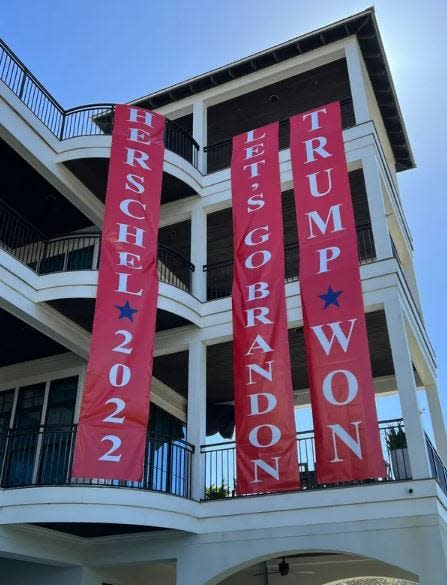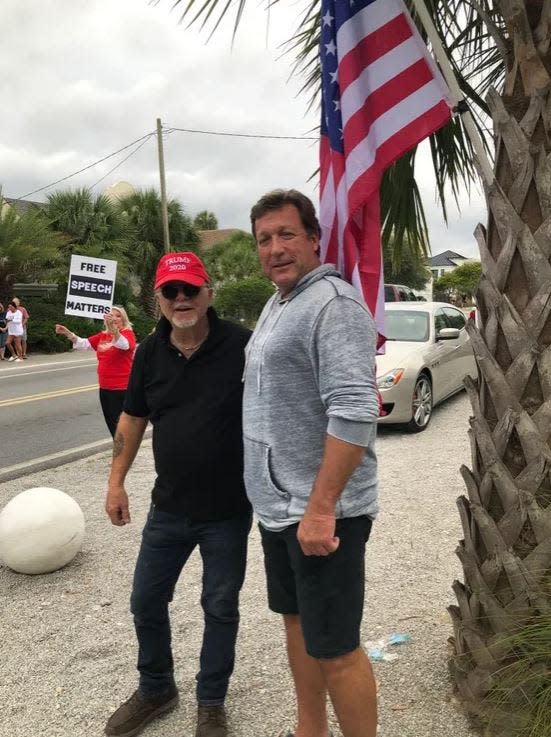'No more of an eyesore than 'Merry Christmas': Trump banner case proceeds in Walton County
- Oops!Something went wrong.Please try again later.
- Oops!Something went wrong.Please try again later.
SEAGROVE BEACH — The owner of a Walton County residence where two massive pro-Trump banners and a third banner supporting Herschel Walker, a U.S. Senate candidate in Georgia, are hanging has legal standing to challenge the entirety of the county's sign ordinance, counsel argues in a brief filed this week in Walton County Circuit Court.
The brief goes on to contend that, contrary to the county's argument in the case, the local sign ordinance is not "content-neutral" and is therefore an unconstitutional abridgement of the homeowner's right to freedom of speech.
Earlier: 30A 'Trump Won' banner battle headed to Circuit Court; homeowner fined $1,269
Also: 'Let's go Brandon' banners remain hanging on 30A home; Trump says, 'keep up the good fight'
Technically, the owner of the Seagrove Beach home at the edge of Walton County Road 30A in Seagrove Beach is Parked Properties, a Georgia-based real estate and property management company.
But the company's owner, Marvin Peavy, who spends time on a weekly basis at the Seagrove Beach residence, is the very public face of a legal challenge to citations issued last year by the Walton County Code Compliance office charging that the two initial banners, reading "Trump Won" and "Let's Go Brandon" (a veiled insult to President Joe Biden) violate signage regulations in the Walton County Road 30A Scenic Overlay district.
The district includes properties like Peavy's that are immediately adjacent to the route.
Those regulations are intended to protect the views along the roadway, a popular tourist route also heavily used by residents that is designated by the state as a scenic highway and also recognized as such by Scenic America, a nonprofit organization dedicated to preserving and enhancing scenic areas across the country.
Specifically, Peavy was cited last year for violating a section of the sign ordinance that prohibits "(s)treamers, feather flags, pennants, ribbons, spinners and other similar devices" within the scenic overlay.
In October, he was found by the county code magistrate to be in violation of the scenic overlay sign regulations for the "Trump Won" banner. He installed the "Let's Go Brandon" banner a few days later.
In November, he was ordered by the county code magistrate to pay a $1,269 fine and to remove the two banners, which stretch along three stories of the residence.
A few days after the order, Peavy appealed that ruling to Walton County Circuit Court.

The banners have remained on the side of the house as the appeal makes its way through the court, and Peavy upped the stakes recently by installing a third banner, reading "Herschel 2022," to the house.
The reference is to Herschel Walker, a former University of Georgia football running back who sparked the team to the 1980 national collegiate football championship and is now running for the U.S. Senate in Georgia as a Republican. Walker handily won the recent Republican primary, and will face the Rev. Raphael Warnock, the Democratic incumbent, in the state's Nov. 8 general election.
The new pro-Walker banner won't result in an additional citation against Peavy, according to recent comments from Mike Lynch, the county's code compliance manager. Lynch explained that once a case is opened on a property, it is considered to be in violation of the applicable ordinance until the case is resolved, and additional activity is not stacked atop an original citation.
Since Parked Properties filed notice in Circuit Court that it was appealing the magistrate ruling, its counsel, William Sickler of the Tallahassee firm Guilday Law, and the county's land use attorney, Steve Hall, have filed briefs back and forth in advance of an eventual ruling by Circuit Court Judge Jeffrey Lewis.
The briefs have focused on two areas of disagreement — whether the county's signage regulations along the Walton County Road Scenic Overlay are too restrictive, and whether the county provided adequate notice of the violation and subsequent legal proceedings to Parked Properties.
With regard to free speech issues, which Peavy has repeatedly contended are the reason he is pursuing the case so doggedly, the brief cites a 1994 U.S. Supreme Court ruling in a Missouri case holding that government officials could not prohibit homeowners from displaying political signs on their property.

In that light, Peavy's counsel contends that the county's assertion in its recent brief that the sign ordinance applied to Walton County Road 30A "leaves other reasonable means for protected speech within this area of special interest" does not sufficiently address the free speech argument.
The brief goes on to contend that because the county did not sufficiently address the free speech argument, "... Parked Properties contends that the County has conceded this issue ... ."
Additionally, the brief cites a 2015 U.S. Supreme Court ruling in an Arizona case which held that a city sign ordinance did not show sufficient reason for discriminating against a church sign.
And: County responds to 30A homeowner: Code violation of 'Trump Won' banners not 'content-related'
"Walton County cannot show that Parked Properties 'Trump Won' banner is any more of an eyesore or traffic hazard than a similar banner reading 'Merry Christmas' or 'Gaetz 2022' (a reference to Rep. Matt Gaetz, who represents Northwest Florida in Congress and is running for reelection this year)," the Peavy brief argues.
Also with regard to speech issues, the brief contends that Peavy can challenge the county's sign regulations in their entirety, and not just as they apply strictly to his case, because they include broad definitions of what constitutes signage and also require permitting, establish numerical limitations and exempt some signage from regulation based on its messages.
As a result, the brief argues, sections of the county's sign regulations "cannot be read in isolation and Parked Properties has standing to challenge them all."
Beyond that, much of the 25-page brief filed Tuesday in Circuit Court concerns itself with how the county provided notice to Peavy of the October hearing.
In part, the filing contends the county did not comply with the process for providing notice, because it posted notice of the violation at the Seagrove Beach residence only 15 days after sending the notice to Peavy via certified mail.
Under state law, the brief contends, the county was required to wait 30 days after sending notice of a violation via certified mail before posting notice at the property.
As a result, Peavy's counsel asserts that the county — which argues in its brief that methods of providing notice can proceed concurrently — was in technical violation of the notice requirements. That, in turn, constitutes "a denial of due process that warrants reversal" of the magistrate ruling to fine Peavy and order that the banners be taken down, his counsel argues.
"If the County's concurrent notice interpretation is adopted," the Peavy brief argues, "a county or municipality could conceivably mail a notice of hearing and post it on the same day, and then hold a hearing 11 days later (because the posting provision only requires a minimum of 10 days' notice) all before the alleged violator had a chance to retrieve the certified mail."
This article originally appeared on Northwest Florida Daily News: 'Trump Won' banner, code violation case proceeds in Walton County

